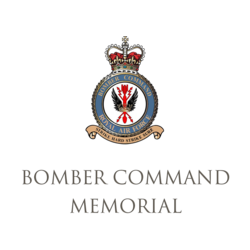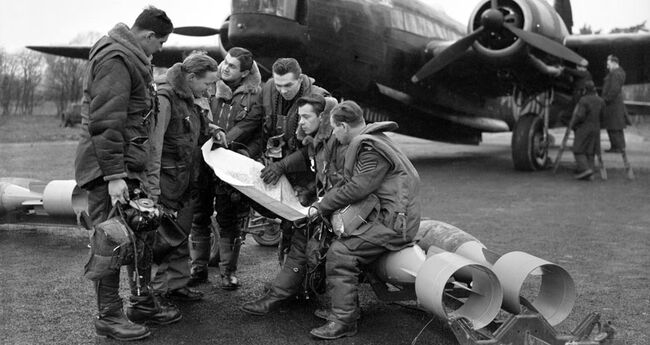
About Bomber Command
55,573 young men died flying with Bomber Command during World War Two; that's more than those who serve in the entire Royal Air Force today.

Most who flew were very young, the great majority still in their late teens. Crews came from across the globe – from the UK, Canada, Australia, New Zealand and all corners of the Commonwealth, as well as from occupied nations including Poland, France and Czechoslovakia.
Strike hard, strike sure
It took astonishing courage to endure the conditions. Flying at night over occupied Europe, running the gauntlet of German night fighters, anti-aircraft fire and mid-air collisions, the nerves of these young men were stretched to breaking point.
The bomber will always get through
RAF Bomber Command was formed in 1936. At the time, it was argued that a strong bomber force provided a deterrent to aggression, as bombing would result in complete and inescapable destruction on both sides. The reality was very different.
Britain on the defensive
War came despite the threat of the bombers. The Nazi Blitzkrieg in 1940 quickly defeated France, leaving Britain to fight on alone. After the RAF's famous victory in the Battle of Britain (during which Bomber Command played a vital and unheralded role, attacking invasion barges in the channel ports), Britain found itself on the defensive everywhere.
To Winston Churchill, and to most of the British people, only the bombers offered a chance to take the fight to the Nazis. Initially the prospects were bleak. Aircraft like the Whitley and Hampden were not capable of launching raids deep into enemy territory, while tactics were primitive and losses were high.
Bomber Command was compelled to switch to inaccurate night bombing in an effort to reduce casualties.
Bomber Harris
It was not until 1942 that Bomber Command gained a real sense of direction, with the advent of Air Marshal Arthur 'Bomber' Harris.
Harris was appointed as commander in chief of Bomber Command in February 1942, with a mandate to begin attacking German industry, much of which was located in large cities.
His objective was to destroy Germany's industrial might and create a collapse in the morale of the civilian workforce, breaking Germany's will to fight on. To understand these intentions, the mood and desperation of the country has to be considered.
Times were hard. Victory seemed distant, and chivalric notions of war fighting had been burned away in the fire of the Blitz. U-Boats were roaming the Atlantic, sinking merchant shipping in an effort to starve Britain into submission.
Harris' promise to make the German people "reap the whirlwind" resonated with a desire to strike back at the mighty Nazi war machine, no matter what the cost.
Thousand bomber raids
The prospects of success were uncertain. Morale among British workers had largely held firm in the teeth of prolonged attacks by the German Air Force.
Harris, however, firmly believed that through a combination of improved aircraft like theLancaster and Halifax, better training and navigational aids, and a ruthless will to press the attack, Bomber Command could knock Germany out of the war.
In May 1942, Harris launched his first "thousand bomber raid" against Cologne.
The scale of the attacks shocked Germany, but the country continued to fight. Further massed attacks did have a devastating effect on the Nazi war economy.
Albert Speer, the German armaments minister, believed that a series of raids like that on Hamburg in August 1943, repeated in quick succession, might well have compelled Germany to surrender.
But that did not happen. There were only so many aircraft and so many crews.
Dam Busters
Other more specialised operations also took place. The famous 'Dam Busters' raid of May 1943 shocked the world with its audacity, as Guy Gibson’s 617 Squadron launched a daring raid on the dams surrounding the Ruhr Valley.
Other attacks, like that on the battleship Tirpitz the following year, eliminated the German navy’s last major surface ship. Raids in 1944 and 1945 against German 'V weapon' launch sites were also a crucial defensive measure, helping to limit attacks from flying bombs and rockets on British cities.
All these operations demonstrated the adaptability of Bomber Command crews, taking on precision strikes with great effect. Still, the focus remained on bombing industry.
From November 1943 to March 1944, Harris launched a series of huge raids on Berlin, promising to knock Germany out of the war in the process. Over 1000 aircraft and 7000 aircrew were lost during the 'Battle of Berlin', but the city struggled on.
The allies would have to invade to finally defeat Germany.
D-Day
Bomber Command switched its attentions to tactical objectives in early 1944, helping to pave the way for D-Day, the allied invasion of occupied Europe.
Bomber Command aircraft played a vital and highly effective role attacking infrastructure around the invasion beaches. Attacking railways, roads and other transport links created chaos behind German lines, preventing the defending forces from massing to repel the landings.
Field Marshal Erwin Rommel, leading the German defence, said: "Stop the bombers or we can't win!"
Dresden
 The closing months of the war saw arguably the most controversial operations, such as the raid on Dresden in February 1945.
The closing months of the war saw arguably the most controversial operations, such as the raid on Dresden in February 1945.
In four huge raids by the RAF and United States Army Air Force, a firestorm destroyed the city centre and killed thousands of civilians.
The planners of the raid argued the city was a vital communications hub and needed to be targeted.
The critics said that Germany was well beaten and the bombing was needless.
The truth is that it was a time of total war, and ideas about the boundaries of conflict were very different than those we have today.
Only those who have lived through similar times could understand or pass judgement.
Operation Manna
1945 also saw another, lesser known mission. From 29 April to 7 May Operation Manna saw Bomber Command crews drop food supplies to the starving people of occupied Holland. Flying at 500 feet in broad daylight over hostile territory, the crews brought vital relief to the civilian population.
Contribution to victory
Bomber Command did not win the Second World War independently - but the war could not have been won without their efforts. The RAF’s attacks forced Germany to divert invaluable men, guns, aircraft and equipment to defend its airspace, effectively opening a second front long before D-Day.
The young men of Bomber Command faced dangers that today we can barely imagine, all in defence of our freedom. Their sacrifice and extraordinary courage should never be forgotten.
The debt we owe
The RAF Benevolent Fund was there immediately after the war to repay the debt we owed bomber crews, and is still there today to help all those who served.
It is our great honour to maintain the Bomber Command Memorial for future generations as a lasting symbol of all that they did in defence of our freedom. It is a fitting tribute to an extraordinary generation, who set the standards of duty and sacrifice by which the RAF still serves today.